
Humans and animals alike all deal with joint discomfort. It’s a common musculoskeletal issue that can result from a lack of necessary nutrients or from fierce & frequent play. Proper joint care can be key to an animal’s long-term well-being. Caring for your dog’s or cat’s body is a matter of education – once you understand the issues at the musculoskeletal level, you can be better prepared to improve your pet’s current conditions and prevent further joint damage. (As always, consult your veterinarian if you have health concerns)
Elements of a Canine Joint
- Two bone endings: like at the elbow, where the humerus bone meets the radius & ulna bones, for example
- Joint fluid: thick, viscous fluid that both lubricates the movement of the bone endings, and supplies nutrients to the surrounding cartilage
- A joint capsule: a membrane that keeps the joint fluid in place around the bone endings
- Cartilage: a smooth, porcelain-like surface that allows for gliding and protects the bone endings
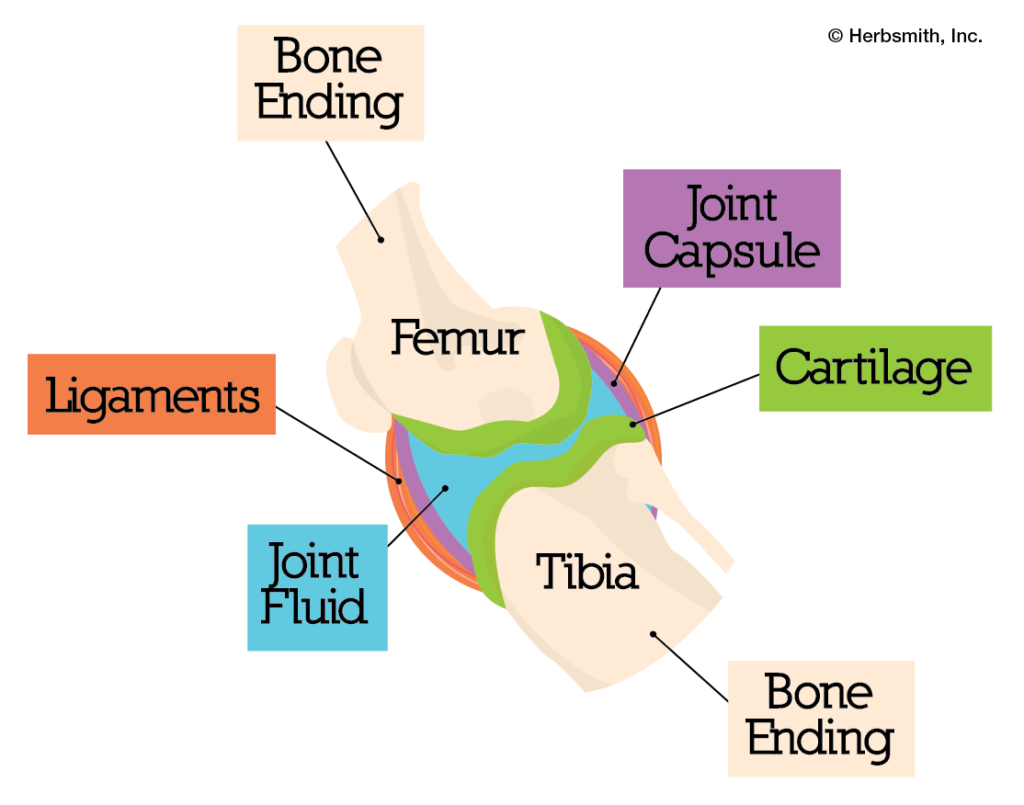
What causes joint issues?
The synovial tissue of the joint capsule may become inflamed, causing the release of degrading enzymes that break down the thickness of the joint fluid. Thinner joint fluid equals less lubrication, which means bone endings won’t glide as smoothly. Joint cartilage can also break down, causing the surface to become rough. This creates firing of nerve endings or discomfort. When mechanical force comes into contact with a weakened joint, there is less to keep it protected. In worst cases, fractures could ensue.
What can be done?
Once you (and your vet) can safely rule out any major injuries, take a look at your pet’s diet and nutrient intake. Being scavenger carnivores, dogs would normally obtain joint fluids from the cartilage and bones of their prey. Now that they are domesticated, their natural source of vital nutrients is missing (especially if they now live on a kibble diet. Kibble lacks many of the necessary nutrients needed to maintain optimal health – switching to a raw diet can help!). Dogs who remain on a dry food diet will need an alternate source for these joint fluid in order to support the proper function of their joints.
Glucosamine, chondroitin, and hyaluronic acid are common joint supplements found on the market (see below for a brief overview of these three supplements). While these supplements are beneficial for your pet, a very small amount of the joint fluid components is actually absorbed into the body. Additionally, most of these supplements only work on a daily basis. For example, when ingested, glucosamine will automatically start working to thicken joint fluid. However, hydrolyzing enzymes also enter the scene and break down the fluid, a natural (but also completely counter-active) bodily response. The next day, the same thing will happen: glucosamine will thicken, enzymes will break down.
Glucosamine
metabolizes into chondroitin and hyaluronic acid molecules (which are 2-3 times bigger than a glucosamine molecule), can help to thicken joint fluid
Chondroitin
a structural component of cartilage, gives cartilage its “sponginess” and helps resistance to compression
Hyaluronic Acid
a component of synovial fluid that lubricates the joints
MSM
- An organic source of sulfur
- Anti-inflammatory effects
Herbs
- Turmeric, yucca, corydalis and boswellia help to maintain healthy soft tissue
- Frankincense and ligusticum help invigorate blood and stop discomfort
- Cinnamon can warm the body and direct action to the limbs
Omega 3 Fatty Acids
- Fish and salmon oil, flax seed
- Prolonged anti-inflammatory effects
Warming Foods
- Ginger, molasses, basil, turkey, chicken, black beans, squash, and oats
- Help to soothe and relax joints
Consistent Moderate Exercise
- Helps to maintain muscle tone & healthy joints
- For a less-traumatic exercise, try swimming
Glucosamine & The Supplement Market
The amount of glucosamine given to an animal every day is important. Animals need a certain amount to reach levels in which the supplement becomes therapeutic (ie – properly supporting joint health). Of course, any amount of glucosamine is better than none at all, but to truly help your dog’s joints, there is a right amount to give daily (see below). Critical evaluation of supplements is completely up to the educated consumer.
Presently, there are no legal distinctions between the mere presence of a substance and an adequate amount of a substance in a product. It is up to the informed pet owner to determine (and demand!) an adequate level of a substance to cause the intended effect.
The recommended daily dosage of oral glucosamine for dogs:
- Less than 30 pounds = 500 – 1000 mg
- From 30 to 50 pounds = 1000 – 1500 mg
- From 50 to 80 pounds = 1500 – 2000 mg
- Greater than 80 pounds = 2000 – 2500 mg
An Example...
A 50-lb dog requires 1500mg of glucosamine a day to maintain the thickness and viscosity of joint fluid. A leading hip & joint product contains 300mg of glucosamine per 6-oz bag. When doing the math, that 50-lb dog would need to eat FIVE, 6-oz bags a day to reach a level that would benefit his joint fluid.
Simply because there is the presence of glucosamine in the product, the company can legally advertise it on the label. However, it does not actually have nearly enough glucosamine to be considered a useful joint supplement. In contrast, a high-quality joint supplement would have the recommended 1500mg of glucosamine in the daily dose.
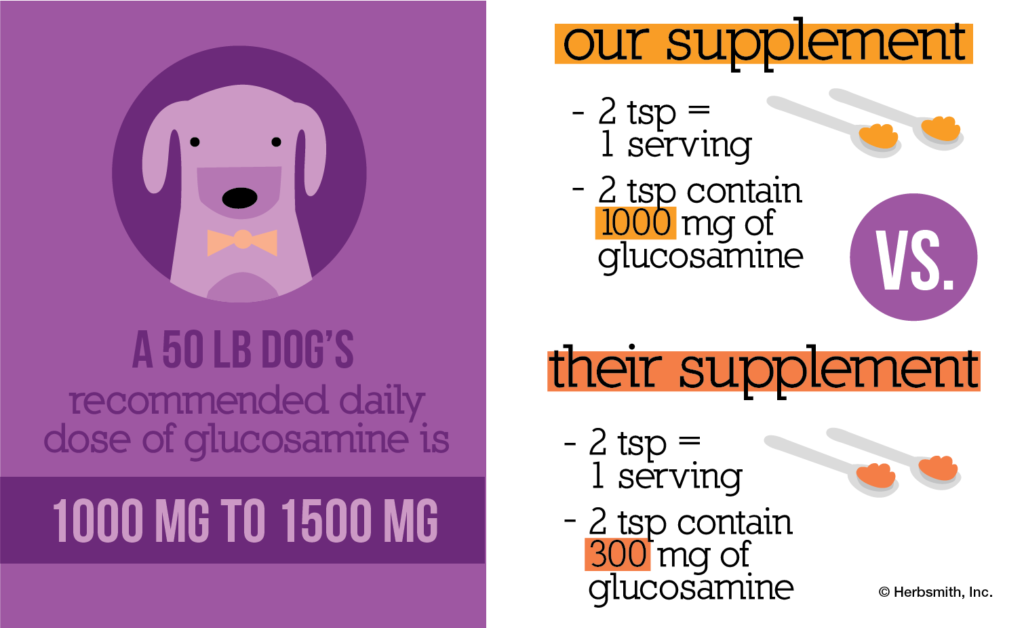
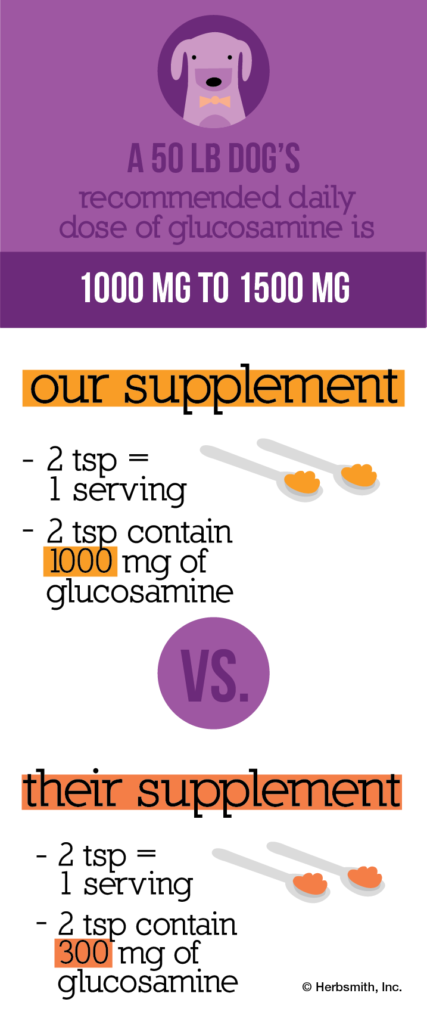
The two things to calculate to compare joint supplement products are the amount of product needed daily to reach a therapeutic level and the price per day. Do the math – be an advocate for your pet!
Herbsmith Joint Supplements
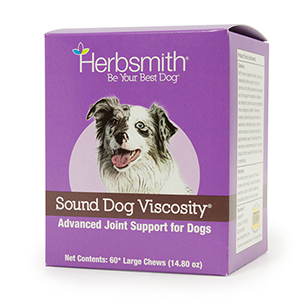
Sound Dog Viscosity
A glucosamine-based formula that aids in joint support by maintaining the normal viscosity of joint fluid. Contains Chondroitin, MSM, Hyaluronic Acid, and herbs to better address all aspects of joint support.
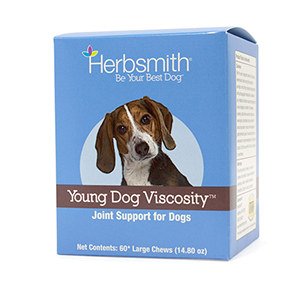
Young Dog Viscosity
A glucosamine-based formula for joint support in younger dogs, with Chondroitin, MSM, and Hyaluronic Acid (and without the herbs). Great for dogs in their first 3-5 years of life
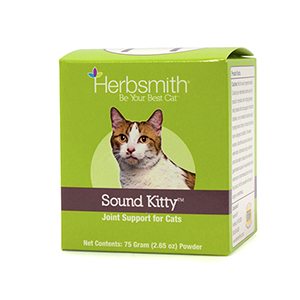
Sound Kitty
A glucosamine-based formula that aids in joint support by maintaining the normal viscosity of joint fluid. Contains chondroitin, MSM, hyaluronic acid, and herbs to better address all aspects of joint support.
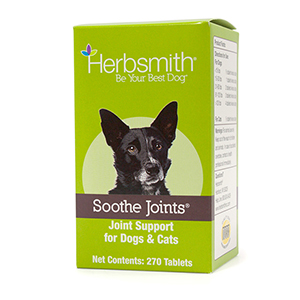
Soothe Joints
Assists in the maintenance of healthy joint capsules and in the preservation of thickened joint fluid. Useful for older dogs, especially during cold or damp weather.
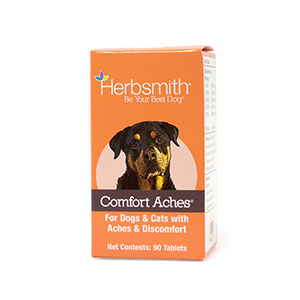
Comfort Aches
Maintains a healthy musculoskeletal system, even in the roughest of play. A unique combination of herbs with a gentle and harmonizing properties.



